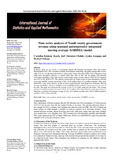Time series analysis of Nandi county government revenue using seasonal autoregressive integrated moving average (SARIMA) model

View/
Date
2020-10Author
Koech, C. K.
Chelule, J. C.
Ayubu, Anapapa O.
Imboga, H.
Metadata
Show full item recordAbstract
In Kenya, there are two levels of government namely the National Government (NG) and County Governments (CGs). NG’s revenue is mainly from taxation, borrowing, and grants among other sources while CGs rely on allocation from NG as well as Own Source Revenue (OSR). CG of Nandi has been using basic descriptive statistics to analyze OSR data such as line and bar graphs with minimal forecasting capabilities. This study focuses on the Nandi county revenue analysis from 2013/14 financial year (FY) to the 2018/19 FY. The analysis showed that the Nandi county revenue department collected an average monthly revenue amounting to Ksh. 19.29 million (Ksh. 231.5 million annually). This study performed a time series analysis on the revenues using Seasonal Auto-Regressive Integrated Moving Average (SARIMA). The best SARIMA model SARIMA(0,0,0)(1,0,0)[12] chosen proved to fit well in the data. The study also projected the revenue of the CG of Nandi going into the future. The average amount of monthly revenues forecasted is Ksh. 34.97 million. This means that the county government of Nandi has a potential of raising an average of Ksh. 34.97 million monthly, Ksh. 104.91 million quarterly and Ksh. 419.64 million annually.
URI
https://www.mathsjournal.com/archives/2020/vol5/issue6/PartA/5-5-9http://hdl.handle.net/123456789/4620
Collections
- Journal Articles (PAS) [273]
